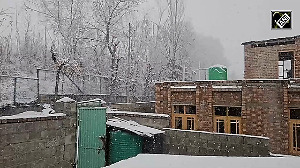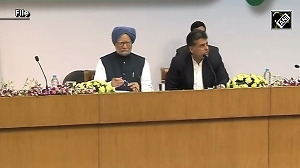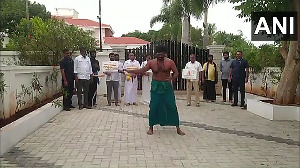The hype that Prime Minister Manmohan Singh's visit to the United States generated in July 2005 is missing on the eve of his three-day tour to Russia, beginning on Sunday.
One reason could be that the days of Awara and Raj Kapoor-flavoured musical romance, and India's Left liberals' fascination with anything Russian that helped create a special bonding between two nations, are now folklore.
Manmohan to ink 4 agreements in Moscow
As former Foreign secretary K Raghunath puts it, "The era of cold war is over. In today's world, all nations try for greater co-operation with the rest of the world. There are no contradictions between Indo-US and Indo-Russia relations. It is not an Either or Or situation. Our relations with Russia are solid, matured and strategic."
However, bilateral trade between the two nations is hardly anything to talk about.
Those part of the India Inc are complaining. Some say they do not get visas on time while other lament about the inefficient and insufficient Banking facilites between two countries.
A leading Delhi-based exporter cites his case. He incurred a huge loss three years ago as the payment for the products that he had exported on credit, could not be recovered in absence of a proper legal system to recover debts.
Trade, key to Indo-Russian ties
Its no surprise that Indo-Russian trade is shamefully low at $1.8 billion (about Rs 8,307 crore) in 2004-05.
However, there are fronts where relations between New Delhi and Moscow hold promise.
The strategic importance of Russia could be ignored at India's own loss while Russia too needs India, its biggest arms buyer.
More recently, both countries have developed common interest in establishing peace and stability in Central Asia.
India wants gas from the region while Russia wants to control the spread of Jihadi terrorism and political discontent in countries like Uzbekistan.
Thankfully, the two countries have been fairly successfully holding annual summits since the year 2000. Former Prime Minister Atal Bihari Vajpayee paid bilateral visits to Russia in 2001 and in 2003. President Putin too visited India during 2000, 2002 and then from December 3-5, 2004, for the fifth India-Russia Annual Summit.
India, Russia keen on bolstering relations
Official-level meetings between the two have also been keeping appointments around the year.
- In 2005 itself, Prime Minister Manmohan Singh visited Moscow from May 8-10, 2005 to participate in the 60th anniversary celebrations of the Victory Day, when he held bilateral talks with President Putin.
- President A P J Abdul Kalam paid a state visit to the Russian Federation from May 20-25, 2005.
- Sonia Gandhi, President of the Indian National Congress and Chairperson of the United Progressive Alliance paid a visit to Russia as a guest of President Putin from June 12-16, 2005.
- Former Foreign Minister Natwar Singh, Oil and petroleum Minister Mani Shankar Aiyar and National Security Advisor M K Narayanan have also visited Russia this year.
Dr Singh, meanwhile, is expected to hold strategic parleys with his Russian counterparts to secure energy from the country. ONGC-Videsh Limited has acquired 20 per cent stake in the Sakhalin-I oil and gas project in the Russian Federation and has invested over $2 billion (about Rs 9,230 crore) in the project, which is the largest investment abroad by India.
Indian Navy seeks 3 more Russian frigates
Russian company Gazprom and Gas Authority of India Limited are also jointly developing a block in the Bay of Bengal.
On the nuclear energy front, Koodankulam Nuclear Power Project, which has a total capacity of 2000 MW, is a good example of the close ties between the two countries. Despite US pressure to withdraw, Russia has helped India set up two nuclear reactors at Koodankulam.
Russia is only country that has openly helped India in its nuclear energy programme.
According to reports from Moscow, both countries may discuss getting help to build four more reactors at Koodankulam.
"America has ways to wriggle out of commitment but Russia always stands firm in spite of external pressures," says a strategic analyst.
Russia endorses civilian nuclear energy pact
Once the important Intellectual Property Rights agreement is signed, it will open the road for joint project to design a new communication satellite Glonass-K.
It is proposed that the Indian booster rockets will send in orbit the Russian-built Glonass-M satellites. To enable its missiles to find their target accurately, Russia will give access to both civilian and military applications of Glonass to the Indian military. Glonass is a space navigation system.
Besides signing the IPR agreement, an amendment to the 10-year Indo-Russia military-technical cooperation programme, extending up to 2010, will be signed during the prime minister's visit. Under the agreement, India will buy $20 billion (about Rs 92,300 crore) worth of arms defence equipment from Russia.
Although both sides would like to have more trade but it seems that strategic ties will prevail more than trade ties.
Russia, which has been India's most important source for arms and defence equipments for decades, might soon become an important source for energy and a co-traveler in the world of space technology.
The low level of trade does not bother many diplomats, who have had a first hand experience with Indo-Russia ties.
Iran has right to develop N-energy: India
Raghunath, former Ambassador to Russia told rediff.com, "One should look at two major investments too. They are worth more than $3 billion (about Rs 13,845 crore). One is in the Sakhalin gas field in Russia and another is the Indo-Russian co-operation in Koodankulam in Tamil Nadu. They are huge investments."
He says that in Central Asia as well, India and Russia have commonality of interests. Both countries want peace and stability in the region.
"There is no clash of strategic interest as far as Central Asian countries are concerned. There is enough room for all. Central Asia is quite close to us and Russia too wants peace in its neighbourhood," adds Raghunath.
Terrorism is another area of common interest for both countries.
Terrorism expert B Raman says, "US and Russia are two major countries that are afraid of nuclear terrorism in the world. US is worried about a potential nuclear attack by Al Qaeda while Russia is worried about nuclear weapons reaching terrorists, who were helping Chechen rebels."
Complete Coverage: PM's visit to Russia






 © 2024 Rediff.com -
© 2024 Rediff.com -